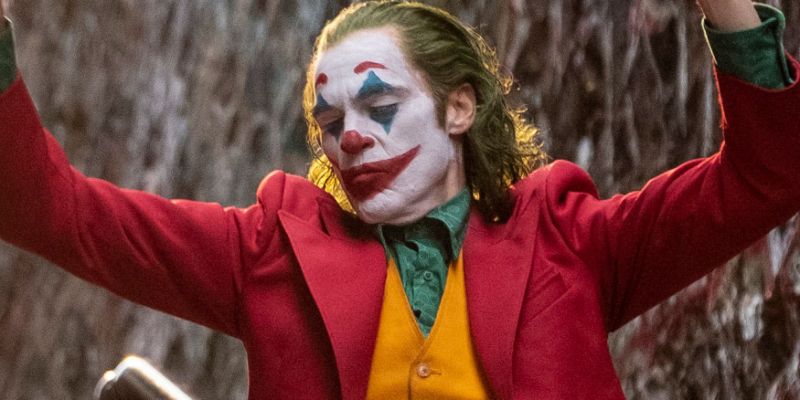“Joker” – “Is it just me, or is it getting crazier out there?” – Arthur Fleck (Joaquin Phoenix)
Filled with grime and crime, Gotham City is a mess.
Piles of garbage lay in alleyways, a couple generations of crowded graffiti proudly shout from concrete walls and no present-day corporate pleasantries – like Time Square, with its welcoming, Las Vegas-like showmanship – can be found anywhere.
Director Todd Phillips’ camera points at a movie theatre with Brian De Palma’s “Blow Out” appearing on the marquee, so the year is 1981. The air is cold, moods are sour, work is scarce, money is tight, and crime is rampant. Walking anywhere on your own, even in the middle of the afternoon, might invite a mugging, and police and ambulance sirens act as constant white noise for a populous without much reason to celebrate…anything.
This is Arthur Fleck’s current environment, and when we first see him, he’s celebrating “Everything Must Go” for a local business. He’s dressed as a clown on a chilly street and spinning a sign with the aforementioned message, when a few kids grab it, smash it and then mash Arthur for no particular reason. This isn’t Arthur’s first beating, because the world has been kicking him around for decades, and his face – with scratchy etched lines, a grayish skin tone and hollowed-out checks – speaks to a lifetime of hardship, probably complete with a steady diet of ramen noodles and soft drinks.
This is Phillips’ mad scientist-creation, a bleak origin story for Batman’s foremost nemesis, The Joker, and Phoenix is the director’s monster. Certainly, this celebrated villain has a long history in print, television and movies, but “Joker” has a story to tell. Arthur descends into criminal madness, but more importantly, Phillips outlines the character’s cracked foundation and cursed circumstances that provide legitimate, explainable grounds for his turn into a sinister baddie.
Meanwhile, Phoenix provides sympathy for the man, one who has been cast away by a grinding, unforgiving Darwinesque system. Still, a publicly-funded therapist does listen to Arthur voice his problems, but as he points out, his issues fall on deaf ears.
“You don’t listen, do you? You just ask the same questions every week. How’s your job? Are you having any negative thoughts? All I have are negative thoughts,” he says.
Physically, Arthur looks sickly and frail with a twisted pipe cleaner’s frame that seems to contort without provocation. A body that matches his mind, pumped with several medications that trip over one another and most certainly cloud and confuse his perspective. He’s searching for logic and light but routinely fines indifference, cruelty and shadows. Phoenix shows some of the ferociousness of Freddie Quell, a massively imperfect protégé in Paul Thomas Anderson’s “The Master” (2012). Quell, however, was deeply askew from the get-go, while Arthur slowly finds his way into spaces of malice.
While Phillips paints a gloomy, cheerless setting throughout the movie’s 122-minute runtime, Phoenix allows Arthur to grow more self-assured and embrace – rather than fight – his surroundings.
This is the film’s hook.
Well, and of course, this is a Joker movie. You won’t, however, see The Caped Crusader and his trusty sidekick, and there are no big budget, CGI “Justice League” (2017) or “Batman v Superman: Dawn of Justice” (2016) entanglements…thankfully. This is a personal, solitary journey between a misunderstood soul versus a nonsensical society, although obvious elements from the comics proudly reveal themselves.
One obvious nod to 80s cinema does not have a superhero origin at all, as Robert De Niro plays Murray Franklin, a Johnny Carlson-like television host who Arthur idolizes. Franklin feels very similar to TV talk show host Jerry Langford (Jerry Lewis) from Martin Scorsese’s “The King of Comedy”, and in that movie, De Niro plays a struggling but ambitious comedian named Rupert Pupkin, a guy desperately striving for fame. Arthur, who is always trying to make people laugh, in some ways is Pupkin, and note that “The King of Comedy” was released in 1982. Probably not a coincidence.
In 2019, one might say that it’s getting crazier out here at the moment, because who would have thought after Heath Ledger’s Oscar winning performance in “The Dark Knight” (2008), another actor would come along and possibly earn Academy Award gold playing the same character? Well, after watching “Joker”, quite frankly, another actor will have to give a superhero-like effort to wrestle the 2020 Best Actor Oscar away from Phoenix.
⭐⭐⭐ 1/2 out of ⭐⭐⭐⭐
Image and Trailer credits: Warner Bros. Pictures




